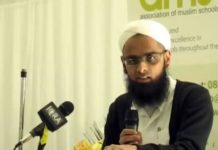Harun Khan, 46, is the youngest and the first British-born leader of Britain’s biggest Muslim organisation, the Muslim Council of Britain.
In his first in-depth media interview since being elected for a two-year term on Sunday, Khan says his priorities will be to empower youth and Muslim women as well as to challenge media Islamophobia and flawed counter-terrorism narratives.
Speaking to 5Pillars editor Roshan Muhammed Salih, Khan also says the government has failed to engage with the MCB since 2010.
Roshan Muhammed Salih: You are now one of the most important Muslims in Britain but the public don’t know you well. So could you tell us a little bit about yourself?
Harun Khan: I’m born and brought up in East London and grew up in the 70’s and 80s in Tower Hamlets. My father came here in the late 50s from Bangladesh and our house (which is near East London mosque) was quite a hub for people to come for help; my father gave them advice on things like immigration and health, and he used to take a lot of people in for lodgings so they could have a place to say. That was his life of service and I hope I can continue that in my own services to the community.
I’m a civil engineer by profession and have been working in traffic and transport engineering for 20 years. I’m in senior management at the moment and I’ll continue doing that because the MCB role is voluntary. All elected members of the MCB get no pay.
On a personal note, I’ve been married for 22 years and have three daughters. I live in Redbridge and am a trustee of Redbridge Islamic Centre.
Subscribe to our newsletter and stay updated on the latest news and updates from around the Muslim world!
RMS: You’ve been involved with the MCB for quite a while. Tell me about the work that you’ve done.
HK: I got involved with the MCB at a very early stage when it was first launched in 1997 at Brent Town Hall. I was there as a volunteer helping out at that event. I carried on over the years just attending events but not engaging too much but in 2006 I got a formal role as chair of the MCB’s London Committee. My remit was to engage with City Hall and through that engagement I was heavily involved in the Eid In The Square event which showed the positive and cultural aspect of Islam and Muslims.
Then in 2010 I was elected as the Treasurer of the MCB and served two terms, that’s four years. And in 2014 I was elected as the deputy of the MCB and now I’m here as the Secretary General.
RMS: Why is the MCB still relevant?
HK: The MCB is really important and we have a 19 year legacy of achievement. The most important thing we do is representation and giving a voice on Muslim opinion in the media, as well as portraying the positive side of Islam and Muslims and affecting policies where we can.
The MCB played quite a major role in getting the question of religion on the census and that was a big success because once you know the numbers you can start addressing polices about what the needs are. Also we’ve played a role in the shaping of religious discrimination and employment laws. On top of that we’ve challenged government policy on a number of issues from the Iraq war through to counter-terrorism legislation which has been ongoing since 9/11.

RMS: How are the MCB’s relations with government at the moment?
HK: I wouldn’t say there is necessarily a relationship at the moment. We’re saying what we need to say in terms of our opinions and the community’s opinions but we’ve not been offered any opportunities to engage since 2010 (when the Conservatives came to power).
There was an issue with relations between 2006-8 but under Gordon Brown’s leadership they did engage with us, but since 2010 it seems to have gone very quiet to say the least. Some departments communicate with us in specific areas of work, let’s say health or foreign affairs. So there has been a minimal level of engagement but not really on domestic policy and on home affairs.
It’s quite surprising to be honest from our perspective. If you’re going to consult with Muslims we are a representative body; we are not the only one but we would like to share our views.
RMS: What are your priorities as MCB Secretary General?
HK: The first objective which I hope has already been achieved is to send out a message that it isn’t just elderly grey men running Muslim organisations. And I say that without insulting the elders who I have huge respect for, but the fact is that we have always faced this criticism. So I hope this misconception has been dispelled.
Moving forward we need to work with younger generations. I see a lot of my generation working in Islamic institutions but I am not seeing the next generation come through. We’ve left behind the millennials who are suffering economically and in society in general so I want to engage them and empower them to do work and that’s going to be one of my key objectives. Young people and women need to be more active in terms of community engagement.
RMS: Terrorism, extremism and radicalisation is what makes the headlines all the time so I guess you’ll be asked to comment on that a lot.
HK: We’ve been consistently challenging the failed approach to counter terrorism. We are very clear about standing against terrorism and making sure that Britain is safe but the way it’s been approached is flawed, and the way the Muslim community is viewed through the prism of counter terrorism is not fair.
Even today the Joint Committee on Human Rights launched its report saying there is no clear definition of extremism and when things are being done without consultation that’s going to happen. The kind of people they choose to consult are hand-picked people who will agree with them, whereas if you are genuine about your approach and you want to address the problem then you also have to consult with people who are not necessarily going to agree with you and will give you constructive criticism.
RMS: How do you think the media will treat you?
HK: We are always inundated with requests in the media from the UK and abroad. We think the media’s view of the MCB is relatively fair but what we do see is that certain elements of the right-wing media treat Muslims badly. And we are challenging a lot of that.
In the current climate there is a lot of anti-Muslim hatred and it’s quite shocking that this kind of thing is allowed to happen so we have to constantly challenge it.

RMS: What about relations between Muslims? They’ve been strained here in the UK because of what’s happening in the Middle East.
HK: We pride ourselves as being an organisation that is non-sectarian; we have Shia affiliates as well and rightly so and affiliates across the different schools of opinion as well. We try to broaden our representation as much as we can and I hope to build on that.
In the UK we have freedom of religion and everyone should enjoy that right irrespective of what’s happening abroad . We can have difference of opinion but we shouldn’t allow that to affect our UK context. We are already facing difficulties on many fronts – not only with Islamophobia but as minority communities struggling economically and with education and employment – so the last thing we want is more division within our own ranks.
RMS: Some in the Muslim community think you’re too close to the Establishment while some in the Establishment seem to think you are dangerous radicals. How do you walk that tightrope?
HK: We get criticism from both sides but I don’t view it negatively. Sometimes it gives you a measure. The other way of looking at it is that rather than “walking a tightrope” we are “middle of the road;” we are not veering to one extreme or the other.
We just need to keep a clear view that what we are trying to do is for the betterment of the majority of Muslims here in the UK, and also we must work for the common good of society in general. What Muslims say and do is projecting to the rest of society and they have a view as well. We are not an insular community, we must be outward looking. We did some work on this with the Visit My Mosque initiative when we host mosque open days, and through work with the media projecting positive aspects of Islam.
RMS: Compared to 20 years ago we have more mosques and madrassas and halal butchers now but in many respects we have bigger problems than we had in the past. Does this frustrate you?
HK: What we need to do as a community is to build the capacity of the people we already have. There are lots of mosques now but what we don’t have is sufficient capability of the people in the mosques. They were built primarily as places of worship and nobody really thought beyond that because that was the priority for the people at the time. The challenge now for the next generation is building people, developing people so that the mosques can become centres of excellence. We need to build capacity more than anything else and have a wider outlook to the rest of the community.






















